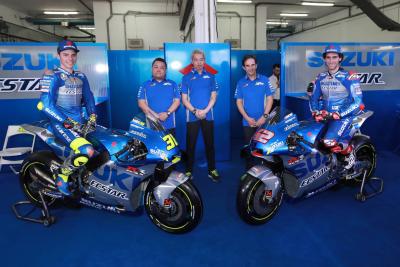Rins, Mir deals show Suzuki 'committed to MotoGP'
In the aftermath of the financial crisis, two manufacturers withdrew from the MotoGP World Championship; Kawasaki (end of 2009) and then Suzuki (end of 2011).
Kawasaki hasn’t been back, focussing its racing efforts on WorldSBK, while Suzuki returned to MotoGP at the end of 2014.
Lockdown restrictions to control the coronavirus are expected to result in another form of the financial crisis, raising questions about whether all current MotoGP manufacturers - Honda, Yamaha, Ducati, Suzuki, Aprilia and KTM - can stay the course.
In the aftermath of the financial crisis, two manufacturers withdrew from the MotoGP World Championship; Kawasaki (end of 2009) and then Suzuki (end of 2011).
Kawasaki hasn’t been back, focussing its racing efforts on WorldSBK, while Suzuki returned to MotoGP at the end of 2014.
Lockdown restrictions to control the coronavirus are expected to result in another form of the financial crisis, raising questions about whether all current MotoGP manufacturers - Honda, Yamaha, Ducati, Suzuki, Aprilia and KTM - can stay the course.
Of the current six manufacturers, only Honda and Yamaha have competed in every season since the introduction of the four-stroke 'MotoGP' era, in 2002.
Ducati joined the following year. Aprilia withdrew at the end of 2004, later supplying a CRT bike before officially returning with Gresini in 2015. KTM then made its premier-class debut at the end of 2016.
In the case of Suzuki, team manager Davide Brivio - who joined the factory for its MotoGP return - believes the new two-year deals signed with Alex Rins and Joan Mir show the company remains 'committed'.
"I took it as fantastic news from our company, the fact that we could renew the agreement of Alex and Joan in this period," he said.
"This happened in the last two-three weeks - not more than a month - and went through the approval of our top management. So to see them doing that in this delicate situation, approving the contracts for ’21-’22, I took as a very good sign.
"It makes us look to the future with confidence. It means that the company is committed to keeping going in MotoGP with the normal activity. To continue thinking in the normal way."
But that's not to say cost-cutting measures aren't needed.
"In the future, everybody will probably have less resources," Brivio said. "The championship is very much related to the manufacturers because in reality the manufacturers are the biggest ‘sponsors’ of every team and, of course, nobody is selling bikes and products at the moment.
"Even at Suzuki, we are a car manufacturer as well as motorcycle and marine engines, but we are not selling those. So all the companies will have to reduce their costs.
"2021 also won’t be like 17', '18 or '19," Brivio continued. "I mean, this crisis seems to be much bigger, but when we had the [financial] crisis in 2008-2009 [MotoGP] slowed down and then slowly built back up.
"We've been asked [by Suzuki] to save budget for this year, to try to reduce costs and from a certain point of view, it's - I won't say easy - but by not travelling, not racing, we are automatically saving some budget.
"Whether this will be enough or not, we are in constant contact with our management and making calculations, reviewing costs and trying to make an estimation of what the budget will look like and things like that.
"I imagine that everybody will have less budget this year and probably next year and that is why freezing development is a good way to go."
The technical freeze will mean the four most successful manufacturers - Honda, Ducati, Yamaha and Suzuki - will not be able to change their engine design until 2022, with new aerodynamic parts delayed until next year.
But what other cost-cutting options are being considered within the MSMA (manufacturers' association)?
"We went through different proposals or solutions and, of course, the biggest expenses are the development of the parts and the technical costs," Brivio explained.
"Another cost, which has already been talked about in the media, is the contract of the riders and the personnel. As you see in football, this is not something you can manage altogether or make as a regulation.
"Another way we considered to save costs in the future is a shorter race weekend and spending less time [travelling]. Also less time away would be a health issue, because the more time you are outside with other people then the risk [of coronavirus] increases.
"We didn’t really come out with a precise proposal yet, but I think after stopping [technical] development we are all open and available to consider any solution. Dorna and all the manufacturers agree we need to discuss more and go into detail to see what we can do in the future.
"But as I said, to renew the contracts with our riders gives me the hope that MotoGP is still considered important [to Suzuki]."
While Suzuki took only a single MotoGP victory between 2002-2011 and was absent from the podium in the three seasons prior to its withdrawal, the factory is now in a much most successful position.
The GSX-RR has claimed three wins since 2015, including two for Rins last season on his way to fourth overall in the world championship.
Both Suzuki riders have also impressed during pre-season testing for the 2020 season, which will now begin - pending government approval - at Jerez in July.
Yamaha is the only other manufacturer to have so far completed its 2021 factory team line-up.



![Johann Zarco, LCR, Honda RC213V, 2024 San Marino MotoGP, Misano, action [Gold & Goose]](https://cdn.crash.net/styles/thumbnail/s3/2024-09/GnG_1166323_HiRes.jpg?itok=vpgrU7Q4)

![Jack Miller, KTM Factory Racing, KTM RC16, San Marino MotoGP, Misano, action [Gold & Goose]](https://cdn.crash.net/styles/thumbnail/s3/2024-09/GnG_1167624_HiRes.jpg?itok=iz7mA4EQ)


![Fabio Quartararo, Monster Energy Yamaha Racing, Yamaha M1, 2024 MotoGP, Misano Test, action [Gold & Goose]](https://cdn.crash.net/styles/thumbnail/s3/2024-09/GnG_1168928_HiRes.jpg?itok=fcYSole_)
![Toprak Razgatlioglu, ROKiT BMW Motorrad, BMW M 1000 RR, Magny-Cours, WorldSBK [Gold & Goose]](https://cdn.crash.net/styles/thumbnail/s3/2024-09/GnG_1165133_HiRes.jpg?itok=GD5SVNVG)

